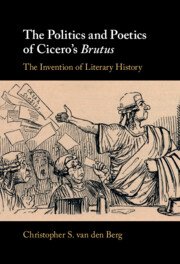
-
Select format
-
- Publisher:
- Cambridge University Press
- Publication date:
- July 2023
- July 2023
- ISBN:
- 9781009281386
- 9781009281355
- Creative Commons:
-
This content is Open Access and distributed under the terms of the Creative Commons Attribution licence CC-BY-NC-ND 4.0.
https://creativecommons.org/creativelicenses - Dimensions:
- Weight & Pages:
- Dimensions:
- (229 x 152 mm)
- Weight & Pages:
- 0.47kg, 308 Pages
- Subjects:
- Ancient History, Classical Studies, Classical Literature
Open AccessYou have access to this book- Subjects:
- Ancient History, Classical Studies, Classical Literature
Book description
Cicero's Brutus (46 BCE), a tour-de-force of intellectual and political history, was written amidst political crisis: Caesar's defeat of the republican resistance at the battle of Thapsus. This magisterial example of the dialogue genre capaciously documents the intellectual vibrancy of the Roman Republic and its Greco-Roman traditions. This book studies the work from several distinct yet interrelated perspectives: Cicero's account of oratorical history, the confrontation with Caesar, and the exploration of what it means to write a history of an artistic practice. Close readings of this dialogue-including its apparent contradictions and tendentious fabrications-reveal a crucial and crucially productive moment in Greco-Roman thought. Cicero, this book argues, created the first nuanced, sophisticated, and ultimately 'modern' literary history, crafting both a compelling justification of Rome's oratorical traditions and also laying a foundation for literary historiography that abides to this day. This title is also available as Open Access on Cambridge Core.
Reviews
‘With this book, Christopher van den Berg has undoubtedly earned the right to occupy a place of absolute prominence in the increasingly dense shelves of critical production on Brutus.’
Alberto Cavarzere Source: Rivista di Filologia e di Istruzione Classica
Contents
Full book PDF-
The Politics and Poetics of Cicero’s Brutus
pp i-ii -
-
- You have access
- Open access
- HTML
- Export citation
-
-
The Politics and Poetics of Cicero’s Brutus - Title page
pp iii-iii - The Invention of Literary History
-
-
- You have access
- Open access
- HTML
- Export citation
-
-
Copyright page
pp iv-iv -
-
- You have access
- Open access
- HTML
- Export citation
-
-
Dedication
pp v-vi -
-
- You have access
- Open access
- HTML
- Export citation
-
-
Contents
pp vii-viii -
-
- You have access
- Open access
- HTML
- Export citation
-
-
Preface and Acknowledgments
pp ix-xi -
-
- You have access
- Open access
- HTML
- Export citation
-
-
A Note on the Text
pp xii-xii -
-
- You have access
- Open access
- HTML
- Export citation
-
-
Abbreviations
pp xiii-xiv -
-
- You have access
- Open access
- HTML
- Export citation
-
-
Additional material
pp xv-xvi -
-
- You have access
- Open access
- HTML
- Export citation
-
-
Introduction
pp 1-19 -
-
- You have access
- Open access
- HTML
- Export citation
-
-
Chapter 1 - Ciceropaideia
pp 20-43 -
-
- You have access
- Open access
- HTML
- Export citation
-
-
Chapter 2 - The Intellectual Genealogy of the Brutus
pp 44-74 -
-
- You have access
- Open access
- HTML
- Export citation
-
-
Chapter 3 - Caesar and the Political Crisis
pp 75-101 -
-
- You have access
- Open access
- HTML
- Export citation
-
-
Chapter 4 - Truthmaking and the Past
pp 102-134 -
-
- You have access
- Open access
- HTML
- Export citation
-
-
Chapter 5 - Beginning (and) Literary History
pp 135-164 -
-
- You have access
- Open access
- HTML
- Export citation
-
-
Chapter 6 - Perfecting Literary History
pp 165-190 -
-
- You have access
- Open access
- HTML
- Export citation
-
-
Chapter 7 - Cicero’s Attici
pp 191-216 -
-
- You have access
- Open access
- HTML
- Export citation
-
-
Chapter 8 - Minerva, Venus, and Cicero’s Judgments on Caesar’s Style
pp 217-243 -
-
- You have access
- Open access
- HTML
- Export citation
-
-
Conclusion
pp 244-255 -
-
- You have access
- Open access
- HTML
- Export citation
-
-
References
pp 256-280 -
-
- You have access
- Open access
- HTML
- Export citation
-
-
General Index
pp 281-287 -
-
- You have access
- Open access
- HTML
- Export citation
-
-
Index Locorum
pp 288-290 -
-
- You have access
- Open access
- HTML
- Export citation
-
Metrics
Full text views
Full text views help Loading metrics...
Loading metrics...
* Views captured on Cambridge Core between #date#. This data will be updated every 24 hours.
Usage data cannot currently be displayed.
Accessibility standard: Unknown
Why this information is here
This section outlines the accessibility features of this content - including support for screen readers, full keyboard navigation and high-contrast display options. This may not be relevant for you.
Accessibility Information
Accessibility compliance for the PDF of this book is currently unknown and may be updated in the future.

